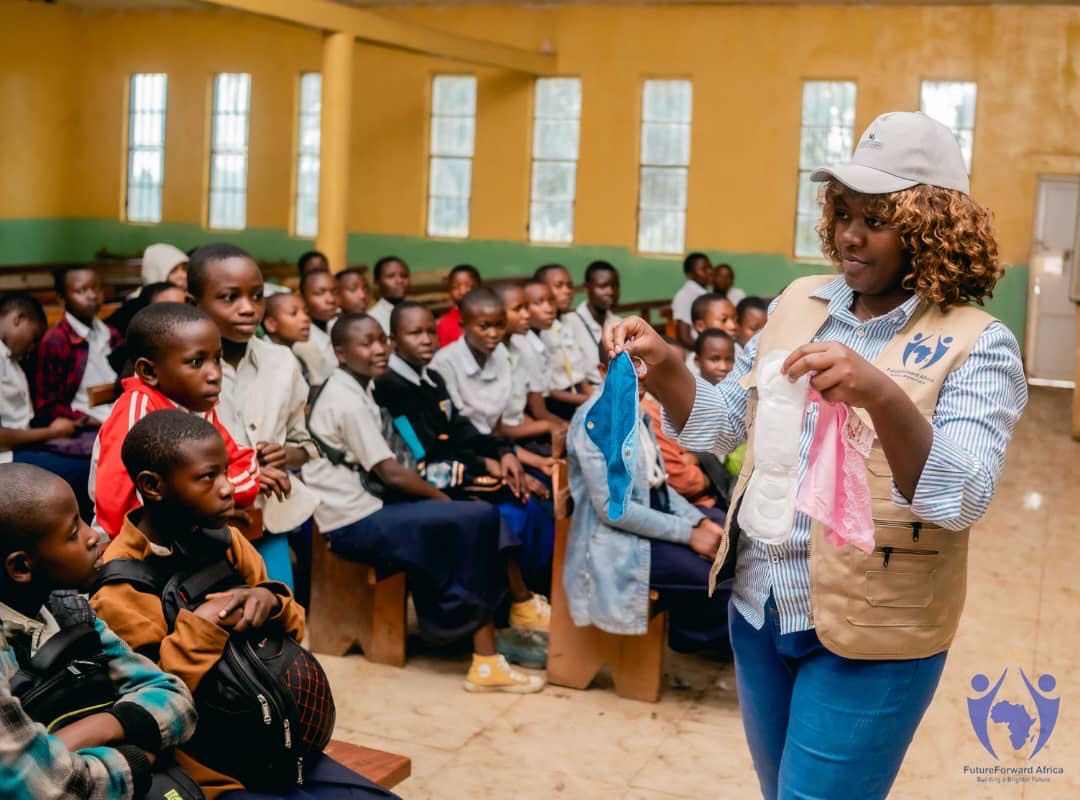In many parts of the world, menstruation remains a deeply misunderstood and stigmatized topic. For many young girls, especially in rural and underserved areas, accessing menstrual hygiene products is a significant challenge. Period poverty, defined as the lack of access to sanitary products, menstrual education, and proper sanitation facilities, is a barrier that affects girls’ education, health, and well-being. At Kabuga High School in Kavumu, a recent event aimed to address this issue by distributing sanitary pads to students and providing essential education on menstruation. This initiative not only helped alleviate the challenges surrounding period poverty but also aimed to break the stigma surrounding menstruation and promote gender equality in education.
The Importance of the Event
The event at Kabuga High School was organized in response to the growing awareness of period poverty in the region. In many rural communities, girls are forced to use unsanitary materials such as old cloth, leaves, or even newspapers during their menstrual cycles due to the inability to afford sanitary pads. This practice exposes them to health risks, including infections, and often results in them missing school during their periods. Studies have shown that many girls are absent from school for up to 5 days a month because of menstruation, leading to a significant loss of educational opportunities and a long-term impact on their academic performance.
Kabuga High School, located in Kavumu, is no exception. Many of the students at the school come from low-income households where the ability to afford sanitary pads is a luxury. This lack of access, coupled with a lack of open conversation about menstruation, has made it harder for students to feel comfortable and confident during their periods. The event was thus a crucial step towards ensuring that these students could continue their education without the worry of menstrual hygiene and its associated challenges.
Sanitary Pad Distribution and Access
One of the primary goals of the event was to provide free sanitary pads to the girls at Kabuga High School. This distribution ensured that the students would have access to sanitary products throughout the school year, mitigating one of the biggest barriers to their participation in school. By providing these pads, the organizers helped reduce the financial burden on families and ensured that girls could attend class regularly without the fear of leaks, discomfort, or having to miss school because of menstruation.
In addition to the distribution, organizers also highlighted the importance of proper menstrual hygiene practices, teaching the girls how to use the sanitary pads correctly and how to dispose of them in a sanitary manner. The act of providing pads was more than just a donation—it was a step towards normalizing menstruation and ensuring that the girls knew how to care for their bodies during their cycles.
Educational Workshops on Period Poverty and Menstrual Health
The second critical aspect of the event was the educational component. Many young girls in rural areas lack access to accurate information about menstruation, which can lead to confusion, fear, and embarrassment when they first start their periods. During the event, workshops were conducted to educate students on menstrual health, the biological process of menstruation, and the importance of maintaining good hygiene during their periods.
The education provided not only aimed to inform the students about the science behind menstruation but also aimed to break down the stigma that surrounds it. Discussions were held on the importance of normalizing menstruation as a natural and healthy part of life, encouraging students to view their menstrual cycle with confidence and self-respect. Furthermore, the workshops focused on debunking myths and misconceptions surrounding menstruation, which are often passed down through generations.
The students were also educated on period poverty and its wider social impact. They learned how access to menstrual products and education is an essential part of gender equality and why it is crucial for communities to work together to ensure that every girl can manage her menstruation safely and with dignity.
Impact on the Students and the Community
The event had a profound impact on the students at Kabuga High School. Not only did they receive much-needed sanitary pads, but they also gained valuable knowledge that empowered them to manage their menstrual health effectively. For many of the girls, this event was the first time they had received sanitary pads regularly, which lifted a significant burden off their shoulders.
The educational aspect of the event also helped foster a sense of pride and self-confidence among the students. It allowed them to openly discuss menstruation without fear of judgment, reducing the stigma surrounding periods and menstruation in their community. The event created a safe space for the students to share their experiences and ask questions, which could help ensure that they continue to seek help and information in the future.
In the broader context, the initiative contributed to raising awareness of period poverty in the community. It underscored the need for sustained efforts to tackle the issue of menstrual hygiene and provided a model for other schools and communities to follow. By addressing period poverty, the event helped level the playing field for young girls, giving them the tools to succeed in school and empowering them to pursue their dreams without the hindrance of menstrual stigma or lack of resources.
The event at Kabuga High School in Kavumu was a crucial step in the fight against period poverty and the promotion of menstrual health education. Through the distribution of sanitary pads and the provision of education on menstrual health and period poverty, the initiative helped ensure that the girls at the school could continue their education with dignity and without fear. The impact of this event extends far beyond the provision of pads—it represents a step toward gender equality, better health outcomes, and a more open and supportive community. This event serves as a reminder of the importance of addressing period poverty in educational settings and the positive change that can come from providing both practical support and education to young people in need.



